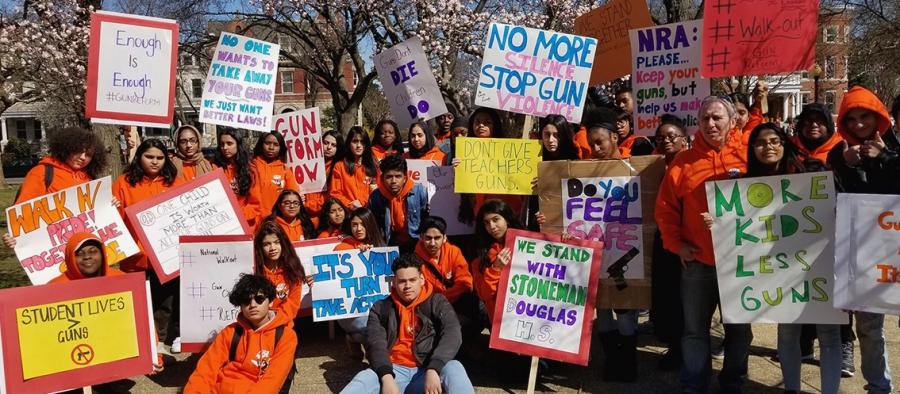
Participating in civics gives students the ability to champion causes, organize, disseminate information and influence public opinion. Students have an opportunity to think, research and get involved in issues they care about. Through civic experiences, they learn they have a voice.
New initiatives like Civics for All and the Soapbox Challenge are transforming the way civics is taught in New York City public schools. Similar to the way literacy is now a part of all content areas, civics is no longer relegated to the social studies department. We’re all able to teach skills to students. Students are no longer waiting for the “real world”; school is the real world. Students can select issues relevant to them and their community to explore in the classroom.
My school, Grover Cleveland HS in Ridgewood, Queens, offers numerous opportunities to engage its students in civic experiences. Graduates of our lifeguard and Emergency Medical Technician programs serve the city and citizens of New York. Our student organizations My Brother’s Keeper and My Sister’s Keeper initiated their first Bridge to the Bronx charity event. Clothing, food and toys collected at our high school were shared with elementary school students at PS 196 in the Bronx.
Our student activities allow for interaction and engagement with others. We have had five students participate in the Soapbox Challenge, a public speaking competition that gives students an opportunity to share a presentation on a topic of importance to them.
A key factor when engaging students in civic experiences is choice and awareness. When a staff member recently passed away, the students worked with the coordinator of student activities to plan and run a memorial. A questionnaire I had my students fill out revealed many of them were separated from their loved ones for the December holidays. The students planned a special lunch celebration with their classmates so they would know they were not alone. To see students engaged in civic experiences while practicing compassion is evidence we have succeeded.
Organizations such as the Mikva Challenge and the Apollo Theater have civic experiences and opportunities for New York City students as well.
To engage your students in civics, the first step is to find out what is important to them. What do they care about? What concerns them? Once students decide on a topic, the teacher can research the best medium and resources available to support students in their study of the issue. If your school has a UFT Teacher Center, it is an excellent resource.
Remember that civics is an important subject to teach. All students, regardless of age or ability, can be engaged in civic projects. These projects often yield concrete artifacts that students can add to a virtual portfolio. And, most important, civics connects students to the world outside the classroom and shows them they can make a difference.
Shawn Fisch is an English as a New Language teacher and the UFT Teacher Center site director at Grover Cleveland HS in Queens.